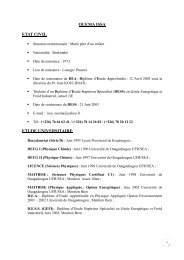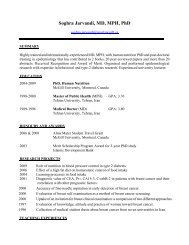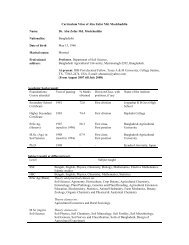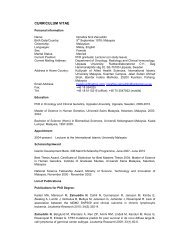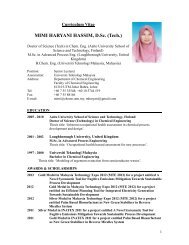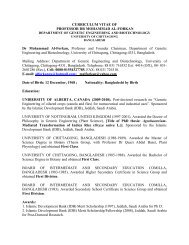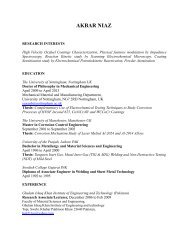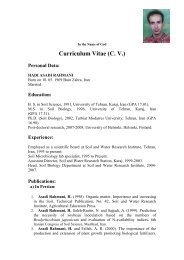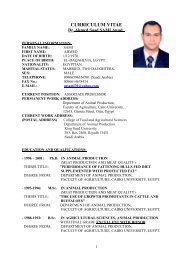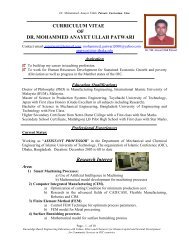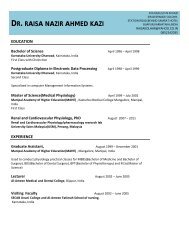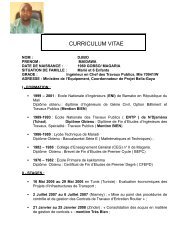Engineering: issues, challenges and opportunities for development ...
Engineering: issues, challenges and opportunities for development ...
Engineering: issues, challenges and opportunities for development ...
Create successful ePaper yourself
Turn your PDF publications into a flip-book with our unique Google optimized e-Paper software.
ENGINEERING CAPACITY: EDUCATION, TRAINING AND MOBILITY<strong>Engineering</strong> education in developing countries should includesignificant coverage of entrepreneurship – how to start, operate,<strong>and</strong> grow a small business. <strong>Engineering</strong> graduates shouldbe equipped to take a path of creating jobs rather than seekingone, if they wish to do so.Developing countries need mechanisms to apply research <strong>and</strong><strong>development</strong> results from local universities <strong>and</strong> companies<strong>for</strong> economic gain. Such mechanisms as incubators <strong>and</strong> smallbusiness <strong>development</strong> financing are needed in the mix.As technology-based economies grow in developing countries,one important source of top talent – in addition to newengineering graduates – is the return of previous emigrantsfrom the diaspora. Several countries that are developing wellhave benefited from the return of <strong>for</strong>mer citizens who see new<strong>opportunities</strong> in their home countries, <strong>and</strong> bring back <strong>for</strong>eignexperience <strong>and</strong> network contacts to the benefit of their homecountries.7.2.3Dawie BothaCapacity-building <strong>for</strong>sustainability in AfricaIntroductionThe continent of Africa has vast natural <strong>and</strong> human resourcesthat remain largely underdeveloped <strong>and</strong> untapped due to anumber of <strong>issues</strong> <strong>and</strong> <strong>challenges</strong>, including:■■Large scale illiteracy, <strong>and</strong> a lack of skills <strong>and</strong> scientific <strong>and</strong>technological expertise due to a lack of education <strong>and</strong> training.The local political <strong>and</strong> social instability that plague manycountries.■includingThe environmental <strong>challenges</strong> prevalent Africanatural disasters caused by both natural phenomena as wellas human interventions.■ Large-scale illness due to poor infrastructure <strong>and</strong> p<strong>and</strong>emicsincluding malaria <strong>and</strong> HIV/AIDS.■■Globalization <strong>issues</strong> that often marginalize African countriesdue to economic policies driven by the more developedcountries of the world <strong>and</strong> consequential exploitationof resources <strong>and</strong> raw materials.Ill-advised aid <strong>and</strong> donor programmes driven by moredeveloped countries <strong>and</strong> international funding agencies <strong>and</strong>structures, which do not necessarily take the principles of■af<strong>for</strong>dability, sustainability, appropriate technology, transferof skills <strong>and</strong> lack of indigenous capacity into account.Poor ability to network locally <strong>and</strong> internationally with peersdue to limited capacity <strong>and</strong> funding resources, impactingnegatively on sharing <strong>and</strong> developing good <strong>and</strong> best practice<strong>for</strong> local <strong>and</strong> indigenous purposes <strong>and</strong> leading to isolation,an inability to keep up with technological progress <strong>and</strong>a decreasing ability to compete in world markets (whichultimately increases dependence on imported technology<strong>and</strong> goods).■ A struggle to aim <strong>for</strong> <strong>and</strong> maintain high ethical st<strong>and</strong>ards<strong>and</strong> adhere to anti-corruption principles in the face ofimposed <strong>and</strong> implied ways to do business from a weak,negotiating position.■ A lack of basic infrastructure to use as a plat<strong>for</strong>m <strong>for</strong> further<strong>development</strong>.■■WFEO St<strong>and</strong>ing Committee on Capacity BuildingGiven the strong relation between creation of acritical mass of educated <strong>and</strong> skilled engineering<strong>and</strong> science graduates <strong>and</strong> economic <strong>and</strong> social<strong>development</strong>, ef<strong>for</strong>ts should be made to buildthese capacities in developing countries. This isone of the conclusions reached by both UNESCO<strong>and</strong> the World Federation of Engineers ( WFEO). Inkeeping with its mission, WFEO created its St<strong>and</strong>ingCommittee on Capacity Building at the WFEOGeneral Assembly in Tunis in 2003. The Committeefocuses on several priority projects, including:<strong>Engineering</strong> <strong>for</strong> the Americas: This project, beingcarried out in conjunction with the Organizationof American States, is focused on developing plans<strong>for</strong> enhancing engineering education <strong>and</strong> practicethroughout Latin American <strong>and</strong> the Caribbean.The focus is on upgrading engineering education<strong>and</strong> on its quality assurance <strong>for</strong> that education.African Initiatives: Many of the societal, human<strong>and</strong> economic needs identified in the MillenniumDevelopment Goals <strong>and</strong> other similar descriptionsA widening gap in communication in spite of electronicadvances (<strong>for</strong> example in Internet access <strong>and</strong> mobile telephony)that is exacerbated by backlogs in services <strong>and</strong>growing populations.The worldwide shortage of engineering <strong>and</strong> built environmentskills has led to a skewed marketplace, which has ledto ‘ brain drain’ <strong>and</strong> still attracts huge numbers of professionalsaway from their home countries in Africa that educatedof the situation in developing countries are presentin sub-Saharan Africa. The WFEO Committee onCapacity Building (CCB) has developed programsto address a significant subset of those needs, inareas of its expertise. Activities have included:engineering education workshops; <strong>development</strong>of accreditation systems; entrepreneurial training,particularly <strong>for</strong> women; stimulation of internshipprograms; electronic delivery of courses; <strong>for</strong>mationof Engineers Without Borders cells; <strong>and</strong> faculty <strong>and</strong>student exchanges.South-South interactions: The CCB has collaboratedin promoting South-South interactions,including technology transfer among developingcountries. For example, CCB has collaborated withthe South African Institution of Civil Engineersto promote meetings of the African <strong>Engineering</strong>Forum, involving a dozen countries in SouthernAfrica. The Institution of Professional EngineersNew Zeal<strong>and</strong>, a member of the CCB is similarlyworking with a group of low population SouthPacific isl<strong>and</strong> nations to address their needs.315



